The role of a Program Director is fundamental in orchestrating the various components of projects to align with organizational goals. They ensure that projects are executed effectively and adhere to budget and timelines, maintaining a bird's eye view over the strategic direction of multiple projects.
Key skills for a Program Director include strong leadership, strategic planning, and exceptional organizational abilities. Additionally, they must possess robust communication skills to effectively convey project goals and expectations to their teams and stakeholders.
Candidates can write these abilities in their resumes, but you can’t verify them without on-the-job Program Director skill tests.
In this post, we will explore 9 essential Program Director skills, 11 secondary skills and how to assess them so you can make informed hiring decisions.
Table of contents
9 fundamental Program Director skills and traits
The best skills for Program Directors include Project Management, Strategic Planning, Budget Management, Risk Management, Stakeholder Communication, Performance Monitoring, Resource Allocation, Change Management and Data Analysis.
Let’s dive into the details by examining the 9 essential skills of a Program Director.
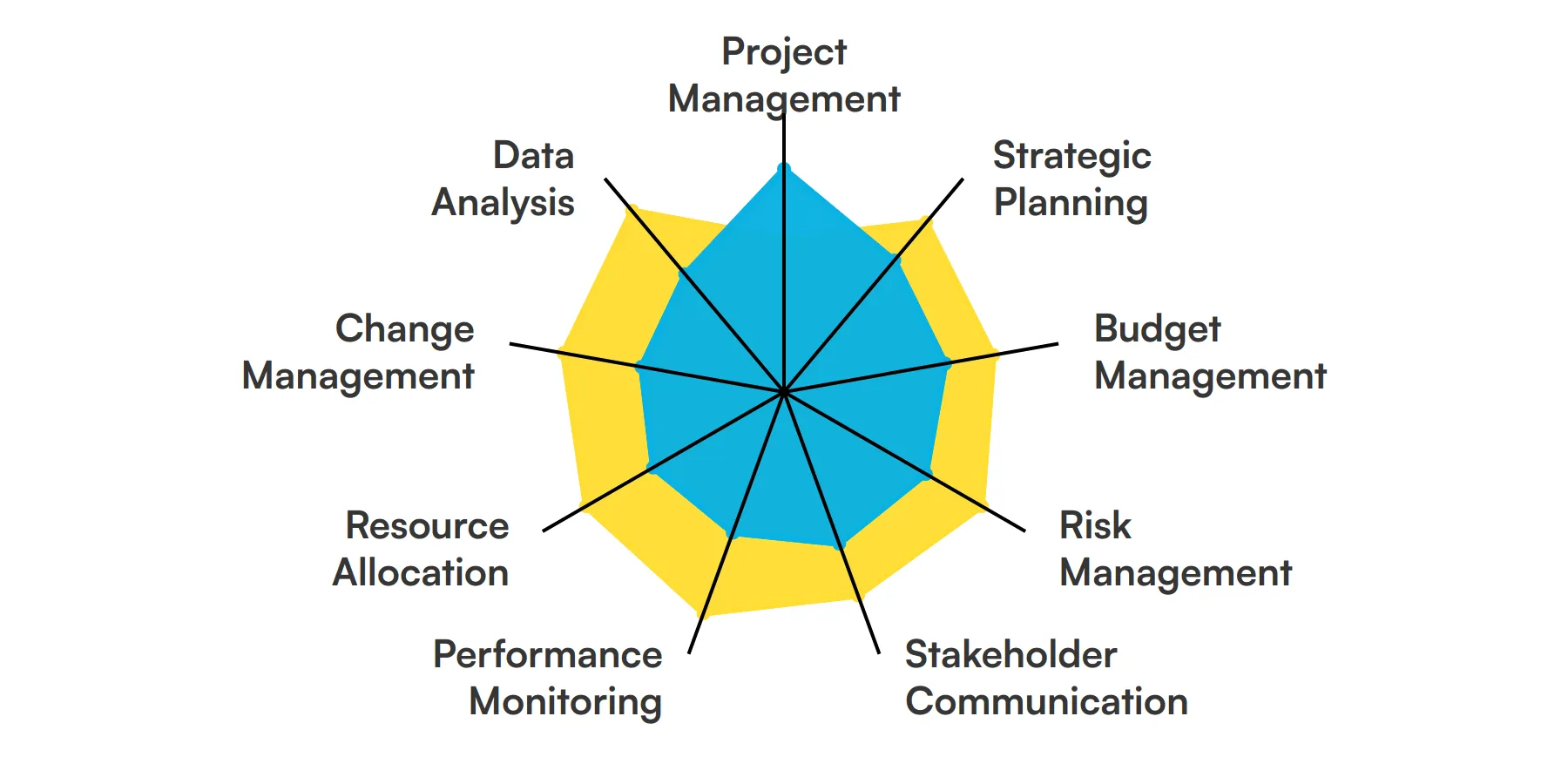
Project Management
A Program Director must excel in project management to oversee multiple projects simultaneously. This skill ensures that all projects are completed on time, within scope, and on budget, which is critical for the success of any program.
For more insights, check out our guide to writing a Project Manager Job Description.
Strategic Planning
Strategic planning is key for a Program Director to align projects with the organization's long-term goals. This involves setting objectives, determining actions to achieve the goals, and mobilizing resources to execute the actions.
Budget Management
Handling budgets is a core responsibility for a Program Director. This skill involves planning, monitoring, and controlling financial resources to ensure that the program operates within its financial limits.
Risk Management
Risk management is essential for identifying, assessing, and mitigating risks that could impact the program. A Program Director uses this skill to foresee potential issues and develop strategies to address them proactively.
Stakeholder Communication
Effective communication with stakeholders is crucial for a Program Director. This skill ensures that all parties are informed, engaged, and aligned with the program's objectives and progress.
Performance Monitoring
A Program Director must monitor the performance of projects and teams to ensure they meet the set standards and objectives. This involves tracking key performance indicators and making necessary adjustments.
Resource Allocation
Efficient resource allocation is vital for a Program Director to ensure that all projects have the necessary resources. This includes human resources, technology, and materials to achieve the program's goals.
Change Management
Change management skills help a Program Director to guide teams through transitions smoothly. This involves preparing, supporting, and helping individuals and teams in making organizational changes.
Data Analysis
Data analysis is important for a Program Director to make informed decisions. This skill involves collecting, processing, and interpreting data to understand trends, measure performance, and guide strategic planning.
Check out our guide for a comprehensive list of interview questions.
11 secondary Program Director skills and traits
The best skills for Program Directors include Conflict Resolution, Technical Proficiency, Time Management, Negotiation Skills, Quality Assurance, Team Building, Adaptability, Documentation, Vendor Management, Training and Development and Customer Focus.
Let’s dive into the details by examining the 11 secondary skills of a Program Director.
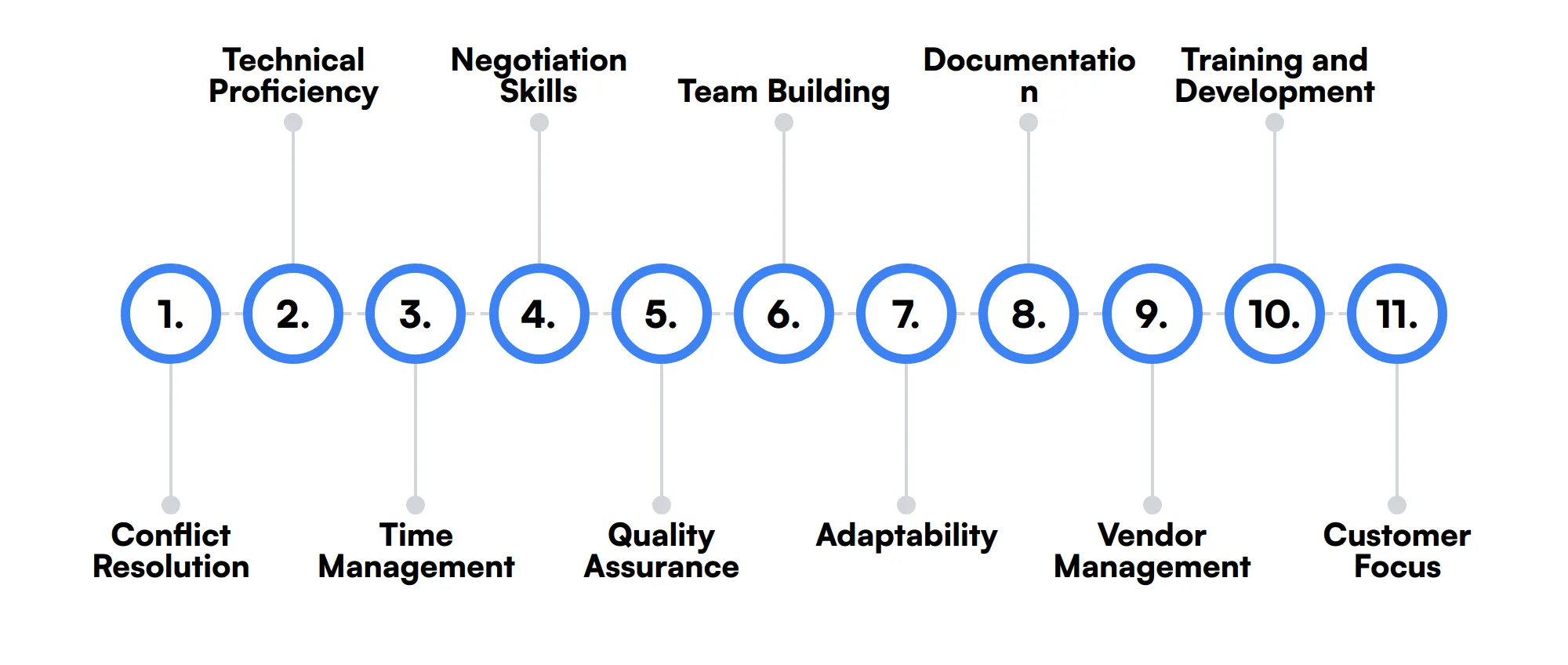
Conflict Resolution
A Program Director often needs to resolve conflicts within teams or with stakeholders. This skill helps in maintaining a harmonious work environment and ensuring that disputes do not derail project progress.
Technical Proficiency
Having a good grasp of the technical aspects related to the program can be beneficial. This allows the Program Director to understand the challenges faced by the team and provide relevant support.
Time Management
Effective time management enables a Program Director to prioritize tasks and manage their time efficiently. This ensures that deadlines are met and projects stay on track.
Negotiation Skills
Negotiation skills are useful for a Program Director when dealing with vendors, stakeholders, or team members. This helps in securing favorable terms and resolving disagreements.
Quality Assurance
Ensuring the quality of deliverables is a key responsibility. A Program Director uses quality assurance skills to set standards and implement processes that maintain high-quality outputs.
Team Building
Building and maintaining a strong team is important for the success of any program. A Program Director uses team-building skills to foster collaboration, trust, and a positive work environment.
Adaptability
Adaptability is important for a Program Director to handle unexpected changes or challenges. This skill allows them to pivot strategies and plans as needed to keep the program on course.
Documentation
Maintaining thorough documentation is essential for tracking progress and ensuring transparency. A Program Director uses this skill to keep detailed records of all aspects of the program.
Vendor Management
Managing relationships with vendors is often part of the role. A Program Director uses vendor management skills to ensure that external partners deliver on their commitments and contribute to the program's success.
Training and Development
Investing in the team's growth is important. A Program Director uses training and development skills to identify learning opportunities and provide resources for professional development.
Customer Focus
Keeping the end-user or customer in mind is crucial. A Program Director uses customer focus skills to ensure that the program delivers value and meets the needs of its intended audience.
How to assess Program Director skills and traits
Assessing the skills and traits of a Program Director can be a challenging task, given the multifaceted nature of the role. A Program Director must excel in various areas such as Project Management, Strategic Planning, Budget Management, and Risk Management. It's not just about having these skills on paper; it's about demonstrating proficiency and the ability to apply them effectively in real-world scenarios.
Traditional resumes and interviews often fall short in providing a comprehensive view of a candidate's capabilities. This is where skills-based assessments come into play. By leveraging tools like Adaface assessments, you can gain a deeper understanding of a candidate's competencies in key areas such as Stakeholder Communication, Performance Monitoring, Resource Allocation, Change Management, and Data Analysis. These assessments can lead to a 2x improved quality of hires and an 85% reduction in screening time.
Incorporating skills assessments into your hiring process ensures that you are not just hiring someone who looks good on paper but someone who can truly excel in the role. Whether it's through scenario-based questions, practical tasks, or data-driven evaluations, these assessments provide a more accurate measure of a candidate's abilities and potential for success.
Let’s look at how to assess Program Director skills with these 6 talent assessments.
Project Management Test
Our Project Management Test assesses a candidate's ability to plan projects from conception to implementation, map timelines, assess risks, allocate budgets, execute the project life-cycle in a phase-wise manner, manage stakeholders, debug issues and deliver a product or service.
The test evaluates skills in cost and budget estimation, situational judgement, understanding of key project roles and stages, designing a project plan, resolving issues and handling changes, and managing and controlling resources. It also covers stakeholder management, prioritizing tasks in real-time, and the basics of agile project management and Scrum as well as traditional (waterfall) project management.
Successful candidates demonstrate proficiency in risk analysis and creating and analyzing project reports. They show the ability to take ownership of a project and work with a team to deliver it.
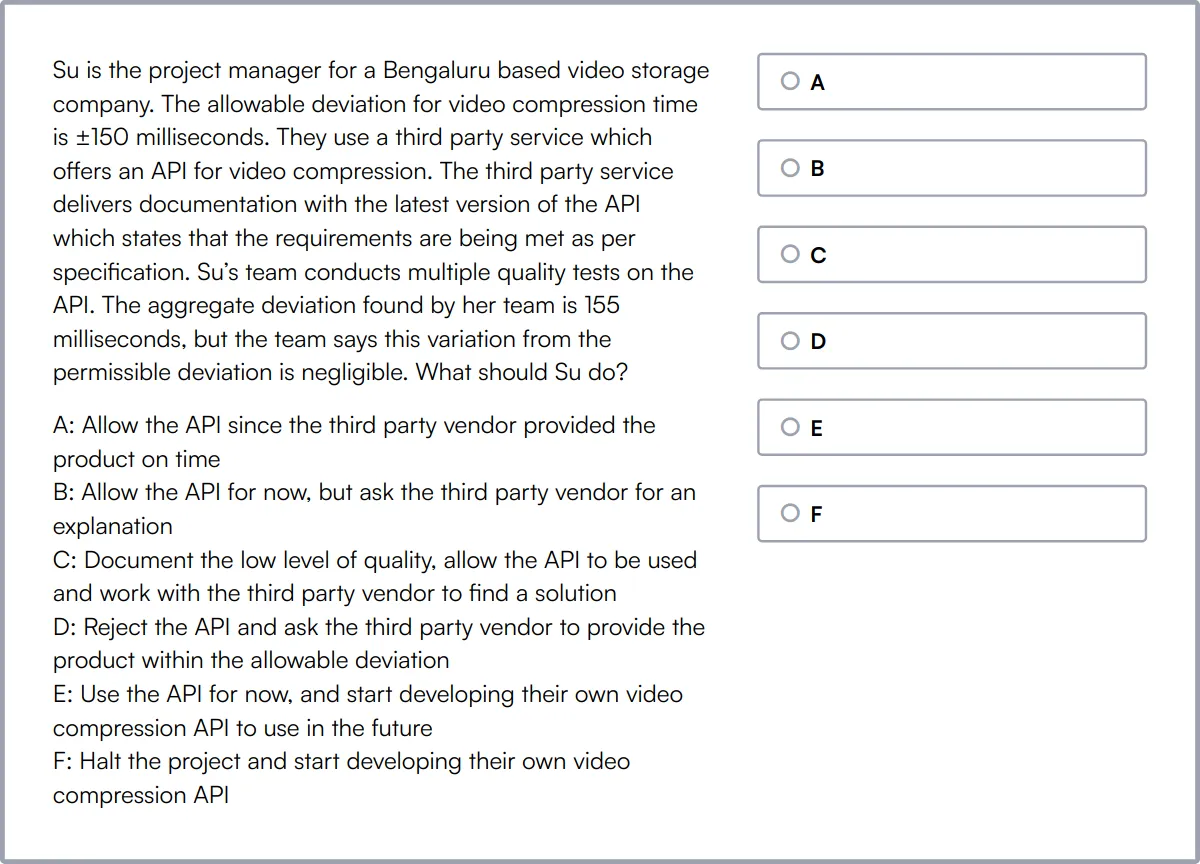
AI Product Manager Test
Our AI Product Manager Test is designed to assess a candidate's knowledge and skills in managing AI-driven products. It evaluates understanding of AI concepts, product strategy, customer insights, project management, and data analysis.
The test covers storytelling, AI fundamentals, generative AI applications, data modeling, project management, data analysis, communication skills, and business analysis.
Candidates who excel in this test demonstrate a strong grasp of AI concepts and product strategy, along with the ability to derive customer insights and effectively manage AI-driven projects.
Financial Accounting Online Test
Our Financial Accounting Test uses scenario-based multiple-choice questions to evaluate a candidate's knowledge and skills related to financial statements and reporting, accounting principles and concepts, budgeting and forecasting, tax compliance and planning, auditing and internal controls, financial analysis and decision-making, and financial software and tools.
The test assesses skills in financial statements, accounting principles, double-entry bookkeeping, assets and liabilities, income and expense recognition, financial ratios, cash flow statement, inventory valuation, depreciation and amortization, and financial analysis.
High-scoring candidates show proficiency in interpreting and analyzing financial data, applying accounting standards and regulations, and communicating financial information effectively to stakeholders.
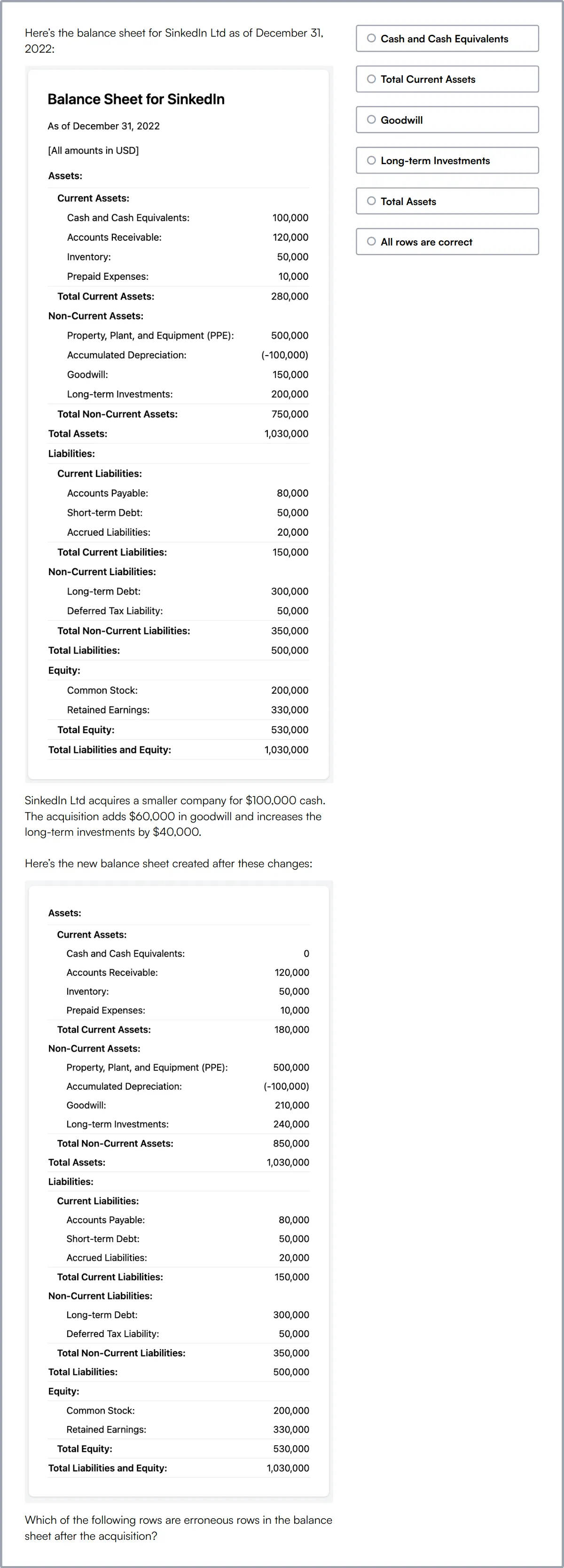
Scrum Master Test
Our Scrum Master Test evaluates a candidate's knowledge and understanding of the Scrum framework, agile principles, and the role of a Scrum Master.
The test covers Scrum, agile framework, sprint planning, product backlog, user stories, iteration review, daily stand-up, retrospective, Scrum artifacts, Scrum roles, and Scrum events.
Candidates who perform well demonstrate a deep understanding of the Scrum framework and agile principles, along with the ability to effectively manage Scrum events and artifacts.
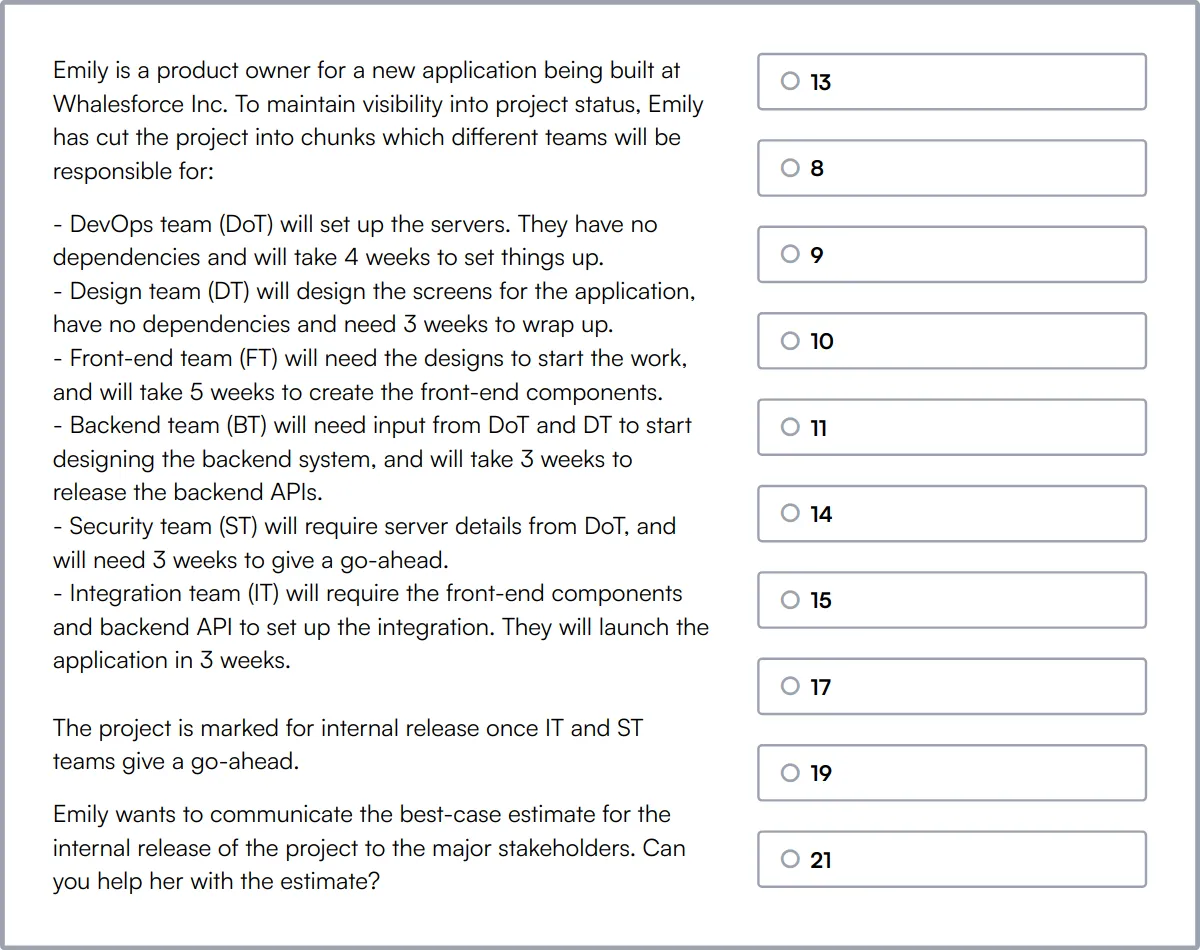
Communication Skills Test
Our Communication Skills Test evaluates candidates' communication skills, including verbal and written communication, active listening, and interpersonal skills.
The test assesses communication skills, situational judgement, attention to detail, critical thinking, and verbal reasoning.
Successful candidates demonstrate strong verbal and written communication abilities, along with the capacity to effectively engage with customers, colleagues, and stakeholders in various professional scenarios.
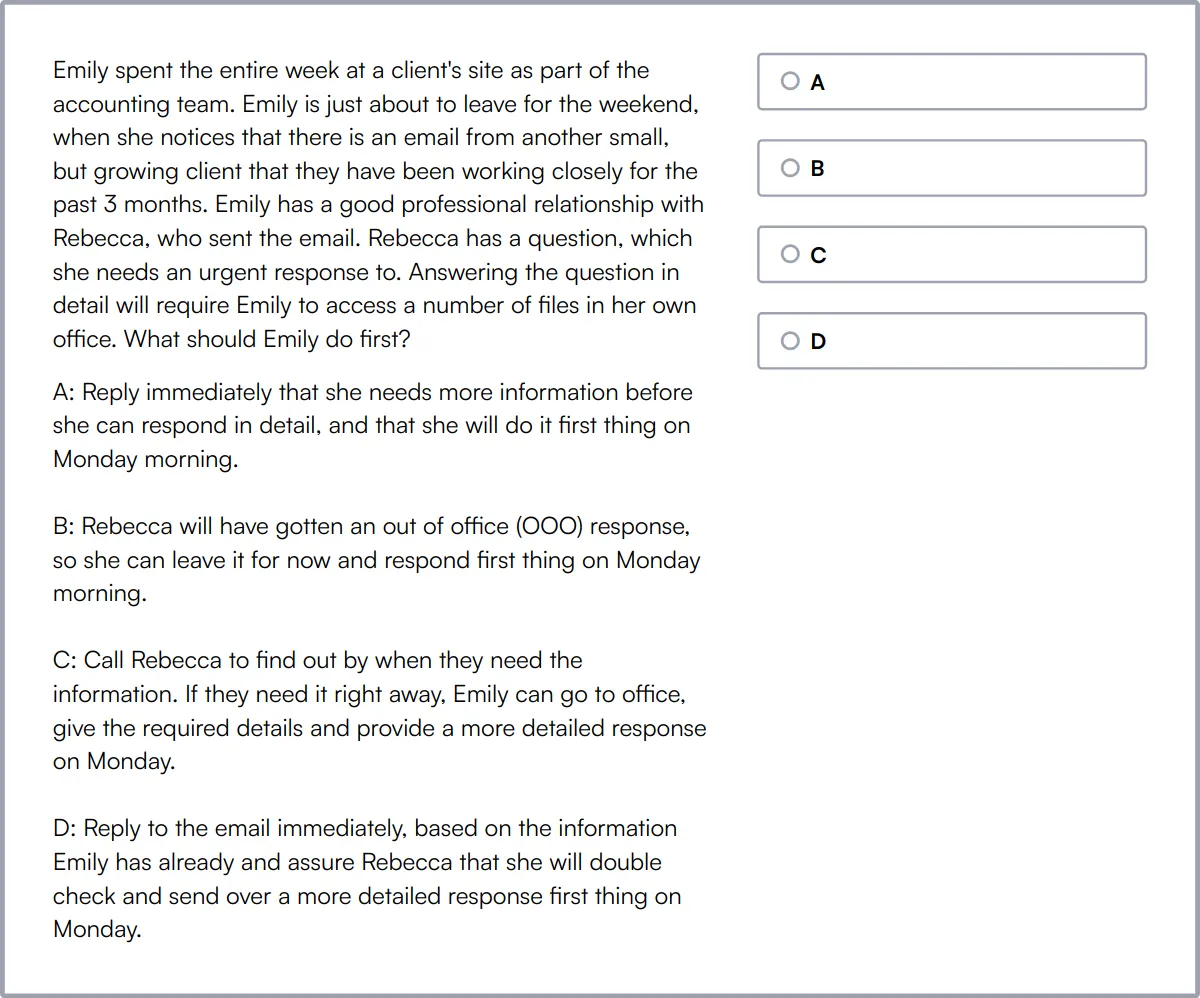
QA Engineer Test
Our QA Engineer Test uses scenario-based MCQs to evaluate candidates on their understanding of various testing methodologies, test planning and execution, bug tracking, and test automation frameworks.
The test covers quality assurance (QA), testing fundamentals, test design techniques, software life cycle, QA programming, program testing, Selenium fundamentals, and Linux fundamentals.
Candidates who excel in this test show proficiency in regression testing, test reporting, documentation, and risk assessment.
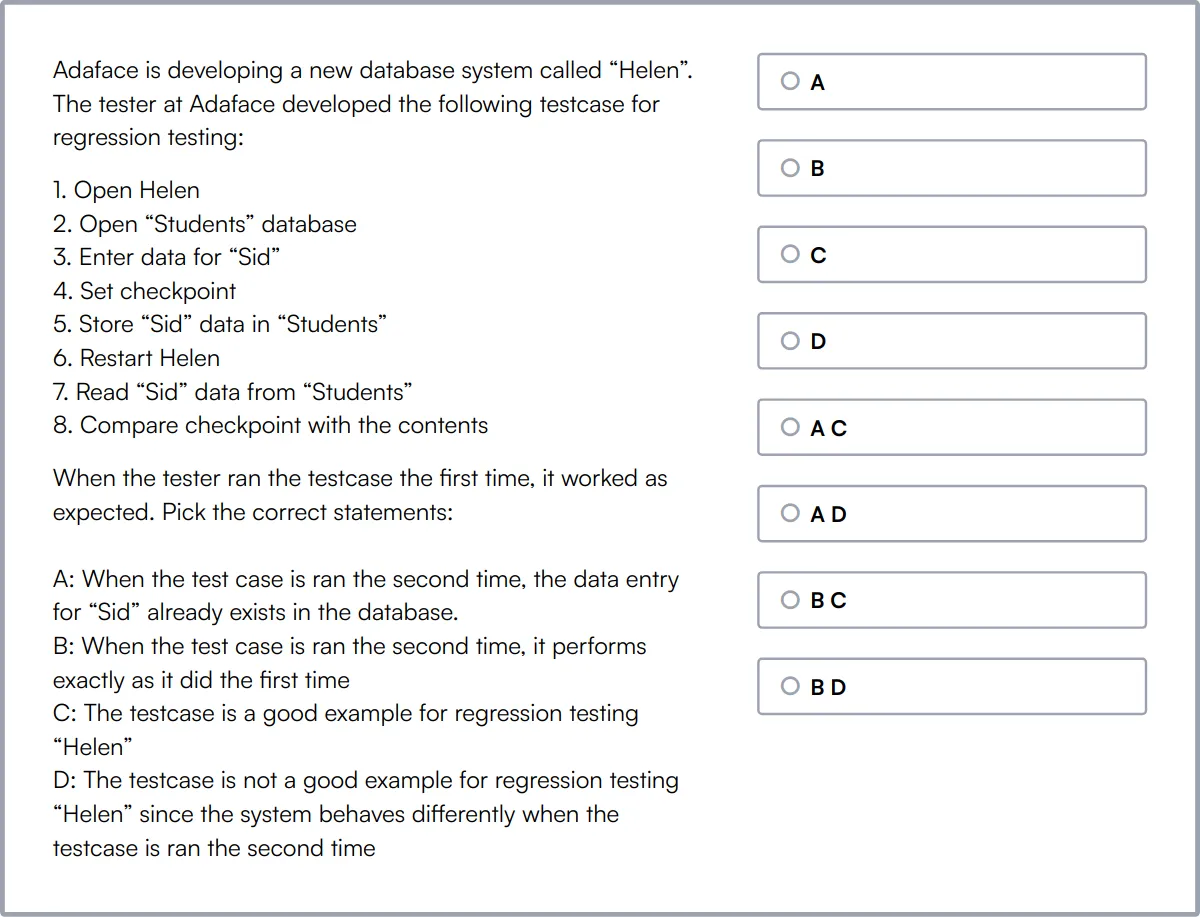
Summary: The 9 key Program Director skills and how to test for them
| Program Director skill | How to assess them |
|---|---|
| 1. Project Management | Evaluate ability to plan, execute, and finalize projects within deadlines. |
| 2. Strategic Planning | Assess capability to develop strategies that align with organizational goals. |
| 3. Budget Management | Review proficiency in planning, allocating, and controlling financial resources. |
| 4. Risk Management | Check effectiveness in identifying, analyzing, and mitigating risks. |
| 5. Stakeholder Communication | Observe skills in engaging and updating stakeholders clearly and regularly. |
| 6. Performance Monitoring | Determine aptitude for tracking and evaluating project performance metrics. |
| 7. Resource Allocation | Examine skill in distributing resources optimally across projects. |
| 8. Change Management | Evaluate response and adaptation strategies to changing conditions. |
| 9. Data Analysis | Assess ability to interpret and derive meaningful insights from data. |
Quality Assurance Aptitude Test
Program Director skills FAQs
What are the key project management skills for a Program Director?
A Program Director should excel in planning, scheduling, and resource allocation. They must also be adept at risk management and performance monitoring to ensure project success.
How can strategic planning skills be assessed in a Program Director candidate?
Assess strategic planning skills by asking candidates to describe past projects where they set long-term goals and aligned resources to achieve them. Look for examples of successful strategy implementation.
Why is budget management important for a Program Director?
Budget management ensures that projects are completed within financial constraints. A Program Director must track expenses, forecast costs, and make adjustments to stay within budget.
What methods can be used to evaluate a candidate's risk management abilities?
Evaluate risk management skills by asking candidates to discuss how they identified, assessed, and mitigated risks in previous projects. Look for specific examples and outcomes.
How important is stakeholder communication for a Program Director?
Effective stakeholder communication is crucial for aligning expectations, gaining support, and ensuring project transparency. It helps in building trust and facilitating smooth project execution.
What are some ways to assess a Program Director's performance monitoring skills?
Assess performance monitoring skills by asking candidates how they track project progress, measure success, and handle deviations. Look for familiarity with performance metrics and reporting tools.
How can a Program Director demonstrate adaptability?
A Program Director can demonstrate adaptability by providing examples of how they successfully navigated changes in project scope, timelines, or resources. Flexibility and quick decision-making are key indicators.
What role does data analysis play in a Program Director's responsibilities?
Data analysis helps a Program Director make informed decisions, identify trends, and measure project performance. It involves interpreting data to optimize processes and achieve project goals.

40 min skill tests.
No trick questions.
Accurate shortlisting.
We make it easy for you to find the best candidates in your pipeline with a 40 min skills test.
Try for freeRelated posts
Free resources



